












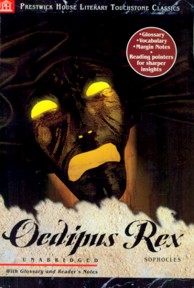
Oedipus Rex by Sophocles – Ancient Greek Philosophical Literature at its Finest.
DESCRIPTION: Softcover: 80 pages. Publisher: Prestwick House (2005). “Oedipus Rex” is a play by Sophocles performed sometime between 430 and 426 B.C., that marks the summit of classical Greek drama’s formal achievement, known for its tight construction, mounting tension, and perfect use of the dramatic devices of recognition and discovery. It examines the story of Oedipus, who in attempting to flee from his fate, rushes headlong to meet it.
At the outset of the play, Oedipus is the beloved ruler of the city of Thebes, whose citizens have been stricken by a plague. Consulting the Delphic oracle, Oedipus is told that the plaque will cease only when the murderer of Queen Jocasta’s first husband, King Laius, has been found and punished for his deed. Oedipus resolves to find Laius’ killer. His investigation turns into an obsessive reconstruction of his own hidden past when he discovers that the old man he killed when he first approached Thebes as a youth, was none other than Laius. Finally, Oedipus learns the truth about himself and his past. At the end, Jocasta hangs herself in shame and guilt-stricken Oedipus sticks needles into his eyes, blinding himself.
In Sophocles’ later play “Oedipus at Colonus” (produced posthumously in 401 B.C.), the old, blind Oedipus has spent many years wandering in exile. He ultimately departs to a mysterious death at Colonus, a village close by Athens, where he will become a benevolent source of defense to the land that has given him final refuge. The play is remarkable for the melancholy and beauty of its lyric odes and for its majestic characterization of Oedipus.
CONDITION: Brand new, unblemished, unread.
PLEASE SEE IMAGES BELOW FOR JACKET DESCRIPTION(S) AND FOR PAGES OF PICTURES FROM INSIDE OF BOOK.
PLEASE SEE PUBLISHER, PROFESSIONAL, AND READER REVIEWS BELOW.
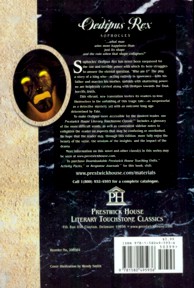
REVIEW: To make Oedipus more accessible for the modern reader, the Prestwick House Literary Touchstone Edition includes a glossary of the more difficult words, as well as convenient sidebar notes to enlighten the reader on aspects that may be confusing or overlooked. The hope is that the reader may, through this edition, more fully enjoy the beauty of the verse, the wisdom of the insights, and the impact of the drama. Sophocles’ Oedipus Rex has never been surpassed for the raw and terrible power with which its hero struggles to answer the eternal question, "Who am I?" The play, a story of a king who—acting entirely in ignorance—kills his father and marries his mother, unfolds with shattering power; we are helplessly carried along with Oedipus towards the final, horrific truth. This vibrant, new translation invites its readers to lose themselves in the unfolding of this tragic tale—as suspenseful as a detective mystery, yet with an outcome long ago determined by Fate.
REVIEW: The tragic story of King Oedipus is one of the great dramas that Western culture has inherited from ancient Greece. It has penetrated the literature, legend, and language of all ages. Towering above the gallery of characters that Sophocles created are two who stand as universal symbols of human nature in its frailty and strength. Oedipus the King, who unknowingly killed his father and married his mother, and who atoned for these crimes by a voluntary act of self-punishment, Antigone, his daughter, who placed right and dignity above her life.
Sophocles, who died at the age of nearly ninety, two thousand four hundred years ago, was one of the world greatest poets and dramatists. He speaks to us today with a message no less necessary and elevating than it was to the Greeks of the fifth century B.C. We too need to be told that man is but a limited and contingent creature, subject to sudden disrupting forces. Success is not finally to be measured by fame or material prosperity. Human greatness consists ultimately in nobly accepting the responsibility of being what we are. Human freedom is found in the personal working out of our fate in terms appropriate to ourselves.
REVIEW: To Laius, King of Thebes, an oracle foretold that the child born to him by his queen Jocasta would slay his father and wed his mother. So when in time a son was born the infant's feet were riveted together and he was left to die on Mount Cithaeron. But a shepherd found the babe and tended him, and delivered him to another shepherd who took him to his master, the King of Corinth. Polybus being childless adopted the boy, who grew up believing that he was indeed the King's son. Afterwards doubting his parentage he inquired of the Delphic god and heard himself the word declared before to Laius. Wherefore he fled from what he deemed his father's house and in his flight he encountered and unwillingly slew his father Laius. Arriving at Thebes he answered the riddle of the Sphinx and the grateful Thebans made their deliverer king. So he reigned in the room of Laius, and espoused the widowed queen. Children were born to them and Thebes prospered under his rule, but again a grievous plague fell upon the city. Again the oracle was consulted and it bade them purge themselves of blood-guiltiness. Oedipus denounces the crime of which he is unaware, and undertakes to track out the criminal. Step by step it is brought home to him that he is the man. The closing scene reveals Jocasta slain by her own hand and Oedipus blinded by his own act and praying for death or exile. 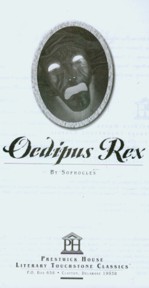
REVIEW: The tragic story of King Oedipus is one of the great dramas that Western culture has inherited from ancient Greece. It has penetrated the literature, legend, and language of all ages. Towering above the gallery of characters that Sophocles created are two who stand as universal symbols of human nature in its frailty and strength. Oedipus the King, who unknowingly killed his father and married his mother, and who atoned for these crimes by a voluntary act of self-punishment, Antigone, his daughter, who placed right and dignity above her life.
REVIEW: Sophocles' Theban plays: "Antigone", "Oedipus the King" and "Oedipus at Colonus". They depict Oedipus's fierce heroic encounter with his gods, and reveal Sophocles' masterful characterizations, dramatic speech and use of irony. Antigone defending her integrity and ideals to the death. Oedipus questioning for his identity and achieving immortality. These heroic figures have moved playgoers and readers since the fifth century B.C. Towering over the rest of Greek tragedy, these three plays are amongst the most enduring and timeless dramas ever written.
REVIEW: Oedipus, the King , is the story of Oedipus, King of Thebes. Abandoned as a young child, Oedipus returns to Thebes, unaware of his heritage and the phrophecy surrounding his birth. The fulfillment of his destiny and of those prophecies results in grave consequences for the royal house of Thebes. Aristotle called "Oedipus The King," the second-written of the three Theban plays written by Sophocles, the masterpiece of the whole of Greek theater. Today, nearly 2,500 years after Sophocles wrote, scholars and audiences still consider it one of the most powerful dramatic works ever made. Freud sure did. The three plays--"Antigone," "Oedipus the King," and "Oedipus at Colonus", are not strictly a trilogy, but all are based on the Theban myths that were old even in Sophocles' time.
REVIEW: Here for the modern reader is the eloquent story of a noble family moving toward catastrophe, dragged down by pride from wealth and power, cursed with incest, suicide, and murder. Sophocles, who died at the age of nearly ninety, two thousand four hundred years ago, was one of the world greatest poets and dramatists. He speaks to us today with a message no less necessary and elevating than it was to the Greeks of the fifth century B.C. We too need to be told that man is but a limited and contingent creature, subject to sudden disrupting forces. Success is not finally to be measured by fame or material prosperity. Human greatness consists ultimately in nobly accepting the responsibility of being what we are. Human freedom is found in the personal working out of our fate in terms appropriate to ourselves.
REVIEW: The first drama in the Oedipus Trilogy, "Oedipus Rex", is the tragic tale of Oedipus who has accidentally killed his father and married his mother. One of the most widely read of all Greek tragedies, "Oedipus Rex", stands as one of not only the greatest dramas from classical antiquity but as one of the greatest dramas of all time. Its influence on literature and theatre cannot be overstated and it is as compelling today as when it was first performed.
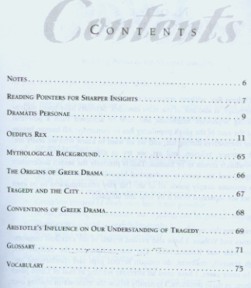
REVIEW: "Oedipus Rex" is not only the most read Greek tragedy, it is also the most misread. The play's reputation exists in part because it is presented as the paradigmatic example of the Greek tragedy by no less an authority than Aristotle in his "Poetics." No doubt this reputation played a part it making it one of the relatively few plays by Sophocles that has been preserved from ancient times. Whenever I have taught the Greek tragedies in various classes my students almost always find in the play the best examples of Aristotle's key concepts of harmartia ("tragic error of judgment"), anagnorisis ("recognition"), peripeteia ("reversal"), catharsis, etc. Still, there is the fact that because even those who do not know the play know the story about the man who killed his father and married his mother, "Oedipus Rex" is usually misread by students. Because they know the curse they miss something very important: the curse that the oracle at Delphi tells Oedipus is not the same curse that was told to his parents.
The only reference to Oedipus by name in Homer appears in the "Iliad" where it says that the king of Thebes died in battle, which suggests he was not blind. At some point in between the time of Homer and when Sophocles wrote this play, the tradition became that Oedipus blinded himself (Ismene refers to it in "Antigone," which was written 15 years earlier but may have been edited later to conform with the more famous work). Sophocles could be playing with the legend again by having the prophecy change because this way there is an explanation for the sin of incest being part of the prophecy: it is added when Jocasta tries to thwart destiny and she herself gives the baby Oedipus over to the huntsman to be killed. Consequently, in the view of Sophocles at least, the incest is a punishment for the actions of Jocasta and not something that the innocent babe Oedipus faced from the moment of his birth.
Anyhow, there is no need for me to convince you that "Oedipus Rex" (a.k.a. "Oedipus the King" and "Oedipus Tyrannos") is a great play and the epitome of the Greek tragedy. So let me instead recommend this Literary Touchstone Edition with it use of sidebar notes to explain terms, concepts and mythological references. Once upon a time it seemed like only Shakespeare got this treatment, so it is nice to see Sophocles being treated the same. Before you read the play there are some Reading Points for Sharper Interest, which give readers some key things to consider whether they are reading the play for the first time or the twentieth. A list of Dramatis Personae is provided before the play and a look at the Mythological Background follows, although reading that latter one first as well could be quite useful.
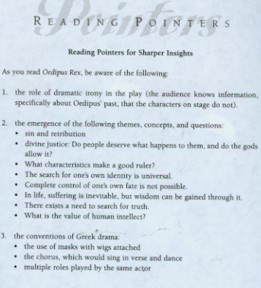
Actually, a lot of what is included in this book would be useful reading before rather than after. The rest of this volume is devoted to brief considerations of the Origins of Greek Drama, Tragedy and the City (looking at the importance of these dramas to the Athenians), Conventions of Greek Drama, and Aristotle's Influence on Our Understanding of Tragedy. If anything, depending on how much you already know about such things, these sections may be too brief. But they do provide some key concepts for better understanding "Oedipus Rex." Even teachers who cannot get classroom sets of this edition to give their students to read can take advantage of what they find here to benefit their students.
REVIEW: Oedipus the King is one of the classic works of Western literature. It was originally written as a play in around 429 B.C. by Sophocles, a Greek philosopher and playwright. It took the Greek world by storm, and has been handed down to future generations who have also been greatly influenced by it. Most notably in modern times, Sigmund Freud (1856-1939) took this work as pointing toward a deep-rooted psychosis, the Oedipus Complex. Oedipus the King (also known as Oedipus Rex or Oedipus Tyrannus) is the story of Oedipus, the king of Thebes, which is suffering under a horrific plague. Finding out that the god Apollo has laid the plague on the city until it should punish the murderer of its previous king, Oedipus pronounces a curse on the murderer and sets out to discover who the murderer was. Sadly for Oedipus, there is fate upon fate wrapped up in this mystery, and doom upon doom. Overall, I found this to be a great book. I enjoyed the information about the play a lot, and believe that it will be very helpful to any reader. But, foremost, I enjoyed the play itself. The story is powerful, and quite enthralling. I have never seen this play acted out, but do think that this translation would make it excellent. I loved this book, and highly recommend it!
REVIEW: This product is extremely helpful when reading Oedipus. It is a fantastic version of the play. It is probably one of the most disturbing stories ever written. Maybe that is why I love it so much--it's a horrible, disturbing story that has managed to keep society hooked for eons with its steady of the omnipotence of fate. Because, yes, despite all the glorious incest that all the high school students obsess over, this is about fate, a man who is doomed to a horrific life from the moment he is born. On top of this is the basic human emotions and attachments, the attempt of the human will to fight fate. It's a hard battle, but it certainly is a good one to read.
REVIEW: I just saw the 1957 film of Oedipus Rex. Wow! What a story. And this translation is extremely good. Sophocles' drama is so simple, and so perfect, that it will probably never be forgotten! This is the ancestor to Hollywood - from 2500 years ago. THRILL to the dramatic exposition of Oedipus' unknowing sins! LAUGH at the gorgeous double-entendres in every second line! SHUDDER at the scene where Oedipus and Jocasta think they have the prophecy licked, and laugh at the gods! This is fine drama, no mistake.
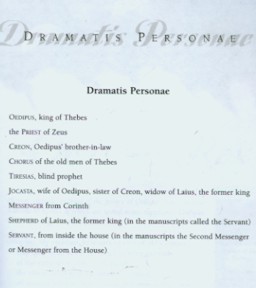
REVIEW: The central statement of Greek tragedy is that Man can not control his Destiny; that there is an ineluctable Fate, preordained and inescapable. No matter how much the poor humans fight against it, it must be fulfilled. And there is no character as tragic as Oedipus in all literature. In this play, we see Oedipus as a successful man who has become King of Thebes, happily married to an older woman named Iocasta. As the play unfolds, we can feel the proximity of something terrible indeed. When the blind sage Tiresias starts to unfold the true story of Oedipus, we can creepily feel the sheer horror that grips him, as he learns that he has killed his father and married his mother, unknowingly. I have no notice of any other plot that can be described as more tragic than this one. Besides, it is one of the main sources of our culture, as with all true Classics. Oedipus summarizes some of our worst fears and traumas: the need to "kill the paternal figure", the "dependency on our mother", the "impossibility of control external forces that shape our fate". It is horrific and fascinating, and there is simply no way to be indifferent to it.
REVIEW: "Oedipus the King" (or, "Oedipus Rex") is probably Sophocles' most famous work, first performed about 429 B. C. It should be required reading for every college Freshman (or High School student). As had been prophesied, Oedipus unknowingly kills his father, Laius, and unknowingly marries his own mother, Jocasta (or, Iocasta). The play has great use of irony. Jocasta recognizes the truth before Oedipus and tries to prevent him from finding out. The play has unsurpassed use of dramatic irony. The play inspires fear and pity in the audience for the hero. It has had a great influence on later authors.
REVIEW: You have to think about love, murder, sex, incest, and self-relinquish. This is not what one might call the typical lifestyle. This is an overall excellant book. Somehow Sophicle's created a story of sex, love, murder, incest, and guilt. One might call it a fight for self awareness. You must admit, after reading this novel you feel a little remorse for the main charcter, Odeipus. I mean, anyone who falls in love with his own mother and kills his father sub-consciously needs pitty. I would recommend anyone to read this book.
REVIEW: Usually plays should be seen and heard, not read. "Oedipus the King" by Sophocles is an exception to this rule. Why do booksellers hide this play in such unappetizing categories as "literature" and "drama"? With the violence, gore, sex and new-age prophecy and paganism in "Oedipus the King", it should be placed in a better-selling category, such as mysteries, thrillers, horror, or sword and sorcery. We did become concerned when we read one scene early in the play. After a priest tells King Oedipus how a plague has ravished his kingdom, Oedipus responds with a speech that boils down to "I feel your pain." Whenever a head of state sounds like a certain notorious cat owner, we get nervous. Fortunately for the plot of this play, if not for Oedipus himself, once he became a suspect accused of patricide and incest, he did more than just claim that he had never inhaled.
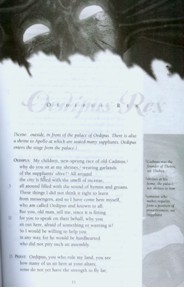
REVIEW: I loved it. In many books, you can experience dry phases where reading it seems more of a chore than a pleasure. In Oedipus The King, I didn't put it down once, it kept me interested the entire time. The plot was so intricate and complicated, yet so simple to follow, I never had to stop to re-read anything. I rarely ever read plays. I may have found a new hobby.
I always ship books Media Mail in a padded mailer. This book is shipped FOR FREE via USPS INSURED media mail (“book rate”). The shipment will include free USPS Delivery Confirmation (you might be able to update the status of your shipment on-line at the USPS Web Site and free insurance coverage). If you are concerned about a little wear and tear to the book in transit, I would suggest a boxed shipment - it is an extra $1.00. Whether via padded mailer or box, we will give discounts for multiple purchases. International orders are welcome, but shipping costs are substantially higher.
Most international orders cost an additional $12.99 to $33.99 for an insuredshipment in a heavily padded mailer, and typically includes some form of rudimentary tracking and/or delivery confirmation (though for some countries, this is only available at additional cost). There is also a discount program which can cut postage costs by 50% to 75% if you’re buying about half-a-dozen books or more (5 kilos+). Rates and available services vary a bit from country to country. You can email or message me for a shipping cost quote, but I assure you they are as reasonable as USPS rates allow, and if it turns out the rate is too high for your pocketbook, we will cancel the sale at your request. ADDITIONAL PURCHASES do receive a VERY LARGE discount, typically about $5 per book (for each additional book after the first) so as to reward you for the economies of combined shipping/insurance costs. Your purchase will ordinarily be shipped within 48 hours of payment. We package as well as anyone in the business, with lots of protective padding and containers.
All of our shipments are sent via insured mail so as to comply with PayPal requirements. We do NOT recommend uninsured shipments, and expressly disclaim any responsibility for the loss of an uninsured shipment. Unfortunately the contents of parcels are easily “lost” or misdelivered by postal employees – even in the USA. That’s why all of our shipments include a USPS delivery confirmation tag; or are trackable or traceable, and are insured. We do offer U.S. Postal Service Priority Mail, Registered Mail, and Express Mail for both international and domestic shipments, as well United Parcel Service (UPS) and Federal Express (Fed-Ex). Please ask for a rate quotation. We will accept whatever payment method you are most comfortable with. If upon receipt of the item you are disappointed for any reason whatever, I offer a no questions asked return policy. Send it back, I will give you a complete refund of the purchase price (less our original shipping costs).
Most of the items I offer come from the collection of a family friend who was active in the field of Archaeology for over forty years. However many of the items also come from purchases I make in Eastern Europe, India, and from the Levant (Eastern Mediterranean/Near East) from various institutions and dealers. Though I have always had an interest in archaeology, my own academic background was in sociology and cultural anthropology. After my retirement however, I found myself drawn to archaeology as well. Aside from my own personal collection, I have made extensive and frequent additions of my own via purchases on Ebay (of course), as well as many purchases from both dealers and institutions throughout the world - but especially in the Near East and in Eastern Europe. I spend over half of my year out of the United States, and have spent much of my life either in India or Eastern Europe. In fact much of what we generate on Yahoo, Amazon and Ebay goes to support The Hermitage Museum in St. Petersburg, as well as some other worthy institutions in Europe connected with Anthropology and Archaeology.
I acquire some small but interesting collections overseas from time-to-time, and have as well some duplicate items within my own collection which I occasionally decide to part with. Though I have a collection of ancient coins numbering in the tens of thousands, my primary interest is in ancient jewelry. My wife also is an active participant in the "business" of antique and ancient jewelry, and is from Russia. I would be happy to provide you with a certificate/guarantee of authenticity for any item you purchase from me. There is a $2 fee for mailing under separate cover. Whenever I am overseas I have made arrangements for purchases to be shipped out via domestic mail. If I am in the field, you may have to wait for a week or two for a COA to arrive via international air mail. But you can be sure your purchase will arrive properly packaged and promptly - even if I am absent. And when I am in a remote field location with merely a notebook computer, at times I am not able to access my email for a day or two, so be patient, I will always respond to every email. Please see our "ADDITIONAL TERMS OF SALE."

